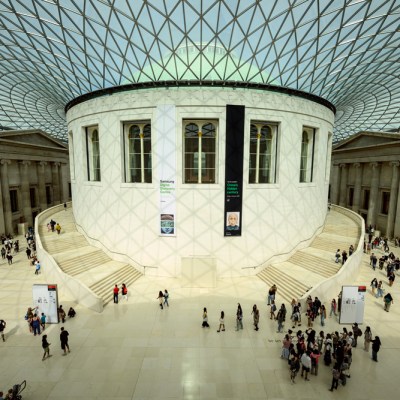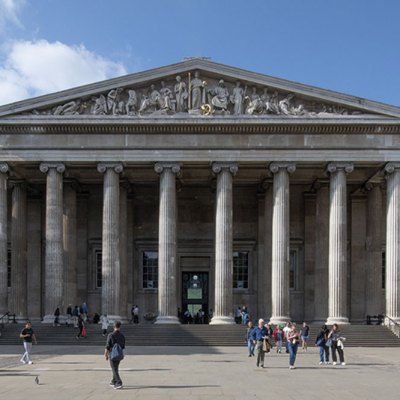Ittai Gradel
‘I’ve been compared to Sherlock Holmes,’ says Ittai Gradel with a wry smile, ‘which is very flattering, but he would have solved the case much more quickly and would have been less naive than me. I had to stumble my way into what happened simply because I couldn’t imagine that it could be true – that I, sitting at my computer on a small Danish island, should have spotted a thief in the British Museum.’ He is referring to the worst breach of trust to afflict any museum in Britain in living memory: the theft of many hundreds of classical gems, pieces of jewellery and other small items from the British Museum over many years by one of its own curators. ‘I’ve been described as a whistleblower, too,’ Gradel adds, ‘but it’s not a word I like, as it seems to imply I wanted to draw attention to myself, whereas I wanted the affair dealt with discreetly and quietly, without scandal.’ As he goes on to explain with increasing exasperation in his clipped Danish accent, he was foiled in that hope by the behaviour of the museum’s management.
Trained as a classical archaeologist and ancient historian in Denmark and Britain, Gradel embarked on what promised to be a distinguished scholarly career, with a tenured post at the University of Reading and a well-received monograph, published in 2003, on the religious cult of the emperor in ancient Rome; but he quickly lost faith in academic life: ‘I was temperamentally unsuited to it. I enjoyed the teaching but found the endless begging for external funding totally depressing.’ He resigned his post to set up in Denmark as a dealer specialising in classical gems. ‘They were immensely popular in the 18th and 19th centuries, so there’s a lot of material out there, but they’re not well understood and are often misdated; so there was an opportunity to make a living from them.’
Gradel kept a close eye on eBay, where occasionally bargains could be found. When in 2016 he saw a fragment of a grey-and-white cameo depicting Priapus being offered for £40 by a seller tagged ‘sultan1966’, he was startled, since he recognised that it had been illustrated in H.B. Walters’ catalogue of gems in the British Museum, published in 1926. Within a few hours the seller had taken the listing down, but not before Gradel had made a screenshot. He had been purchasing gems from ‘sultan1966’ at low prices for a couple of years; the seller had identified himself as ‘Paul Higgins’ and plausibly explained that he had inherited the gems from his grandfather. Gradel said nothing about the cameo’s link with the British Museum, to avoid alerting the vendor to his suspicions. Only in May 2020 did information emerge about two gems listed by ‘sultan1966’ that confirmed Gradel’s fears that ‘Higgins’ was selling gems stolen from the museum – and recently stolen, demolishing the story about the grandfather. Gradel then noticed that one of his eBay receipts from ‘sultan1966’ was linked to the bank account of someone called not Paul Higgins but Peter Higgs. At that point an intriguing detective story turned darker: Peter Higgs was the name of a curator in the British Museum’s department of Greece and Rome – who, surely not coincidentally, was born in 1966.
Gradel emailed the museum’s deputy director, Jonathan Williams, with details of his concerns, including the name of the suspected thief, but received no more than a brief acknowledgement. Months later he wrote to the director, Hartwig Fischer, only to be told by Williams that the matter had been investigated and that no evidence had been found of impropriety by anyone on the museum’s staff. Higgs had by then been appointed acting head of his department. Fearing that the evidence of theft he had provided was being ignored, Gradel contacted George Osborne, chair of the museum’s trustees. Meanwhile, in the course of 2022 an audit by an external curator revealed that well over a thousand items in the Greek and Roman department were missing or had been damaged in attempts to remove their gold mounts. When – after delays in part engineered by Higgs – Osborne was told about this by Fischer, he made the connection with the information he had received from Gradel.
There was now no possibility of keeping the matter hushed up. In August 2023, a month after Fischer announced that he would be stepping down in a year’s time, the museum issued a press release revealing the thefts and stating that an employee (later revealed to be Higgs) had been sacked. Gradel was incensed that there was no admission of culpability by the museum’s management, despite a clear attempt to cover up the thefts, and so broke his self-imposed rule not to talk to the press. In the ensuing row Fischer left the museum with immediate effect. Williams in turn left at the end of 2023.
When Mark Jones, a former director of the Victoria and Albert Museum, was appointed temporary director, he seized the opportunity to clear out the Augean Stables. Jones is one of the few people involved in the saga for whom Gradel has a good word to say. In his speech at the trustees’ dinner last year, Osborne – who denies that there was a deliberate cover-up – thanked the hapless Fischer for his service, but although he referred to the thefts, he did not mention Gradel, despite the immense debt the museum owes him.
Since then Gradel has returned to the museum several hundred gems that he had retained – mostly glass impressions of academic interest but little financial value – and has bought back from past clients museum gems they had purchased from him. He has given up dealing – ‘the shock of the British Museum story took all the joy out of it’ – but his participation in a popular BBC podcast on the thefts, Shadow World, has encouraged him to plan a book about the saga. As he emphasises with some anger, the attempt to cover up the thefts made the situation far worse than it needed to have been: ‘I think the moral is the importance of transparency for a great institution such as the British Museum – openness, openness, openness.’
Ittai Gradel at his home in Rudkøbing, Denmark, in November 2024. Photo: © Rico Feldfoss

Michael Hall is a former editor of Apollo.



